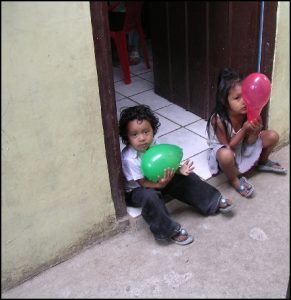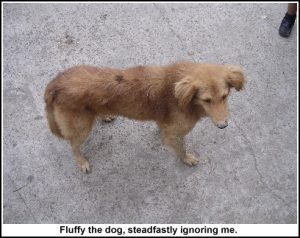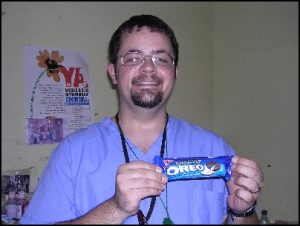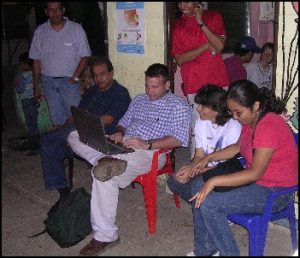Breakfast worked better this day. We got toast and jelly and it didn’t even take all that long.
Ash took my list of meds we’d run out of or were otherwise low on and headed to a local pharmacy with Jo Ann and Butch. The rest of us piled into Sylvana’s van and headed back to our pre-school clinic site.
We had nearly reached our clinic and were passing near the new neighborhood clinic site—the one with no staff and no medicine—and were a bit surprised to see a great deal of activity around it. The gates were open and there were many people standing around outside with decorations. In fact, the road past it had been blocked off due to all the new vehicles so we had to take a different route to our clinic. Later, Jo Ann explained to us that this day was the grand opening for the neighborhood clinic and there would be much celebrating going on there throughout the day.
“But they’re not really about to open, right?” I asked.
“No,” Jo Ann said. They still had no staff and no meds and no money for either, so the actual opening day was still months and/or years in the future.
“Huh.”
Despite that, the grand-opening celebration did continue throughout the day. We knew this because we could hear loud music coming from the direction of the other clinic which was broken up only by incredibly loud fireworks that sounded exactly like mortar shells going off. Tremendously loud. I thought for a moment they were indeed firing rounds into the air, because it was that loud. It made for a very trying day, because it seemed like every time I had to measure something into exact amounts in a delicate fashion, BOOOOM! and I’d nearly spill everything. Fortunately, there was not a lot of blood to be drawn in our clinic, or I could see horrible ramifications of the explosions. This went on throughout the morning and into the afternoon, making us all extremely nervous as we tried to go about our business in what sounded like a war zone. I began to suspect they were doing it on purpose to try and get back at us for inadvertently showing them up at their own job. I mean, how dare we open up a free clinic and treat patients when there was a perfectly good pay-clinic, with balloons, food and fireworks, albeit utterly devoid of doctors and medicine, just down the road?
Meanwhile, we had far more patients to see than the day before. Apparently word had spread of what we were doing. Fortunately, Dr. Grace was still with us, so we passed out extra number tickets that morning so we could see more patients. This would turn out to be a decision with ramifications.
One observation I and other folks on our mission staff made was that the people in this part of El Salvador did not seem to be suffering from the same sort of ailments as those we saw in Guatemala. In Guatemala, there was lots of dehydration, parasite problems and the occasional mother whose baby suffered from a heat rash so she bundled him up in three layers of cloth and was terrified to open the bundle even a crack for fear the infant might catch a chill. In San Salvador, we had no cases of scabies come through and not as many internal parasite cases. I know this because we prescribed no scabies treatment and very few doses of Flagyl. What we did see were a lot more diabetes cases, gastritis, fungal infections and high blood pressure. And we wound up having vitamins prescribed to nearly every patient, child or otherwise.
Once again, the local people are huge believers in the power of vitamins, so Dr. Allen and all the other docs prescribed away, continuing the valid philosophy that if the patient believes they’re getting better they’ll likely get better. We still had plenty of children’s vitamins, but had run out of adult vitamins on the first day in San Salvador. To make up for the loss, we—with doctors orders, mind you—began giving out prenatal vitamins to the adults. According to Dr. Allen, it’s basically the exact same stuff as regular adult vitamins, only these came in horse-pill form rather than the tiny little red pill form our regular adult vitamins took. We were thankful that there was a language barrier in this instance, but still tended to mark out the Pre-Natal labeling on the bags.
 Though we were all terribly busy, I once again began looking to find things to give out to the children we were seeing. Since I’d exhausted my supply of little flashlights in Guatemala, I returned to giving out balloons. I kept a wad of them in my pockets and when traveling between clinic stations to ask questions, I would often blow one up and give it to a child. However, once again, if I gave a balloon to one single child out on their own, I soon had a cluster of them around the pharmacy door looking up at me with hope in their eyes. This was cool with me, though. Between prescriptions, I blew up balloon after balloon, passing them out to the kids at the door. I had given balloons to a brother and sister, who sat in the doorway across the hall from the pharmacy to play with them. Before long, we heard, POW! as the brother’s balloon popped. Thanks to the fireworks, my spine automatically seized up at the sound and I was sure most of the spines of the people in the clinic room these kids were sitting near probably had too. However, the brother looked very sad at the loss of his balloon, so I blew up another one for him. A few minutes later, though, there was another POW! After that, I decided he’d had his quota of balloons, because my nerves certainly had theirs of small explosions.
Though we were all terribly busy, I once again began looking to find things to give out to the children we were seeing. Since I’d exhausted my supply of little flashlights in Guatemala, I returned to giving out balloons. I kept a wad of them in my pockets and when traveling between clinic stations to ask questions, I would often blow one up and give it to a child. However, once again, if I gave a balloon to one single child out on their own, I soon had a cluster of them around the pharmacy door looking up at me with hope in their eyes. This was cool with me, though. Between prescriptions, I blew up balloon after balloon, passing them out to the kids at the door. I had given balloons to a brother and sister, who sat in the doorway across the hall from the pharmacy to play with them. Before long, we heard, POW! as the brother’s balloon popped. Thanks to the fireworks, my spine automatically seized up at the sound and I was sure most of the spines of the people in the clinic room these kids were sitting near probably had too. However, the brother looked very sad at the loss of his balloon, so I blew up another one for him. A few minutes later, though, there was another POW! After that, I decided he’d had his quota of balloons, because my nerves certainly had theirs of small explosions.
There were quite a number of stray dogs in the area. We even began giving them nicknames that seemed to match their appearances. My favorite was Fluffy Dog, who was a pretty little fluffy dog, albeit a bit scraggly from life on the street. None of the dogs seemed mean or dangerous in any way, but just hung around the clinic and the people looking for any stray bits of food that might fall. And food didn’t have to be human food either. I saw hungry dogs gobbling up the cicadas that had been unfortunate enough to fall out of their tree. And at night, the place was a veritable cicada buffet for the dogs.
 I also noted that most of the dogs wouldn’t respond to me when called. I tried everything I know that usually works on dogs, such as whistling through pursed lips or barking or whining or just calling “Hey dog!” but they ignored me steadfastly. Even when Fluffy Dog wandered into the pharmacy, I could not coax any kind of reaction out of it, even to try and shew it away. Butch pointed out that this was an El Salvadorian dog, so it didn’t speak English. He was joking, but there actually seemed to be some truth to this.
I also noted that most of the dogs wouldn’t respond to me when called. I tried everything I know that usually works on dogs, such as whistling through pursed lips or barking or whining or just calling “Hey dog!” but they ignored me steadfastly. Even when Fluffy Dog wandered into the pharmacy, I could not coax any kind of reaction out of it, even to try and shew it away. Butch pointed out that this was an El Salvadorian dog, so it didn’t speak English. He was joking, but there actually seemed to be some truth to this.
Throughout the week, we noticed that when anyone local wanted to get the dogs’ attention, they used a sharp “Tsst-Tsst” sound, blowing air between their teeth. This form of non-verbal communication was not limited to human/animal interaction, either. We saw mothers use it to get their kids’ attention and we saw plenty of kids use it to try and get our attention, particularly when they wanted a balloon or something similar.
Our rate of patient turnover in the morning had been a steady one, thanks in large part to Dr. Grace. After lunch, we gave out quite a few more number tickets to see even more patients. Seventy-five of them, in fact. Unfortunately, we didn’t check first to make sure we had all our docs present and accounted for. It turns out that Dr. Grace had a job interview to go to that afternoon and was therefore not going to be with us. She had alerted someone on the mission staff about this before departing, but the message didn’t get relayed to all fronts until after the 75 new patient tickets had been distributed. So essentially, the slowest docs in the place (i.e. the Gringos) were left with the remaining patients who hadn’t been seen before lunch plus 75 new ones. We realized very quickly that this was not going to be an early evening for anyone.
This realization, in addition to the continuing fireworks barrage was enough to make any fake-Shemp pharmacist a bit cranky. However, I was finding new reasons to get irritable on my own, starting with the docs, who were prescribing pills in amounts other than what we had already pre-bagged the week before. Typically, we gave each patients 20 pills of most meds, with the exceptions of such things as Mebendazole, which usually gets taken three times a day for a week, so 21 pills. Almost all the docs began prescribing drugs in amounts of 30 pills, forcing us in the pharmacy to have to take time out to count out 10 extra pills from one bag to put in another and then to keep track of the bag with 10 less. Our Sharpie markers were kept flying, revising each pill amount as the docs kept sending new ones.
Now, I understand how this happens. Let’s say you’re a doctor or a student playing a doctor and you’re now charged with seeing nearly 90 patients between 1 p and sometime well after dark. Your job is now to care for the patients as best you can and get as many of them through as quickly as possible. So if someone’s complaining of a headache, you’re prescribing Ibuprofen or Tylenol and you’re writing it down quick. Moving so quickly, you’re likely to forget that all such painkilling pills have been pre-bagged in doses of 20 pills per bag and you prescribe 30 to give them a month’s supply. Once you’ve done this a couple of times, it sticks in your head and you keep prescribing that amount for the rest of the day. Meanwhile, Mary Ann and I are in the pharmacy pulling out our hair with each new prescription because it’s slowing down our already bogged process to have to stop and redo everything that comes in. We didn’t just go back and tell the docs to cut it out because for all we knew these patients truly needed the 30 pills and not 20, so we just kept following orders and losing more and more hair. Our mantra became a very Nancy Kerigan-esque “WHY? WHY? WHYYYYYY?!!!!” Soon, though, we translated this into “Porque? Porque? Porqueeeeh?!!!” for the benefit of the local staff, who would laugh at us.
Before long, we had the patients laughing at us as well, because we would utter this cry whenever anything went bad for us—such as when we got butterfingers and dropped our meds on the floor, or ran into one another in the cramped room, or had to fend off a cicada attack. I imagine that our antics sometimes resembled a Marx Brothers movie and we tended to get that kind of reaction from the locals. Instead of making me more irritable, though, having the locals laugh at me kind of brought me back to reality and let me remember what we were really doing there. It wasn’t easy work, but we were supposed to try and make the best of it and get the job done. Plus, getting to put a comedic spin on things was a good way of diffusing irritation, because I certainly didn’t want the locals to think I was unhappy to be there.
 Wednesday afternoon, Tito went down the street to a store and came back with treats for everyone. He gave me two little 4-packs of Oreos, one of my all-time favorite cookies. I was so happy to have these little slices of home that I had a picture taken with one of them to commemorate the moment. I broke into the package and began devouring the cookies with glee. Then my glee turned to confusion. These Oreos did not taste like proper Oreos. They weren’t stale or past their expiration or anything. They just didn’t taste like Oreos are supposed to taste. It’s like they were cheap Oreo knock-offs that looked exactly like Oreos, down to the lettering on the wafers, but they did not replicate the Oreo taste AT ALL. It’s not that they even tasted bad. As far as cookies go, they were okay. But they were definitely not Oreos. I gave my other pack to Ashley, who had a bite of one cookie and then gave them all back to me.
Wednesday afternoon, Tito went down the street to a store and came back with treats for everyone. He gave me two little 4-packs of Oreos, one of my all-time favorite cookies. I was so happy to have these little slices of home that I had a picture taken with one of them to commemorate the moment. I broke into the package and began devouring the cookies with glee. Then my glee turned to confusion. These Oreos did not taste like proper Oreos. They weren’t stale or past their expiration or anything. They just didn’t taste like Oreos are supposed to taste. It’s like they were cheap Oreo knock-offs that looked exactly like Oreos, down to the lettering on the wafers, but they did not replicate the Oreo taste AT ALL. It’s not that they even tasted bad. As far as cookies go, they were okay. But they were definitely not Oreos. I gave my other pack to Ashley, who had a bite of one cookie and then gave them all back to me.
This is just one example of how some products sold both in Central and North America may have the same brand name but taste radically different. Another prime example is Fresca Cola. In America, Fresca is now a diet drink. It has kind of a citrusy grape-fruity thing going, but is nothing to write home about. In Central America, Fresca is a full-sugar soda that’s bursting with citrus flavor. Ashley spoke highly of it when she came back in 2003 and was itching to get hold of some while she was in Central America for this trip. Fortunately, Fresca practically flowed like rivers wherever we went and the mission teams of both Guatemala and El Salvador had plenty on hand. The strange thing is, Coca Cola, the manufacturer of Fresca in both regions, used to sell regular Fresca in the states as well as a diet version of the same. Over the past couple of decades, however, the regular drink vanished and the diet drink took its name in some kind of unholy cola coup. These are the kind of odd little things I tend to remember.
Mid-way through the afternoon, Butch set his gecko free. He let it go in the hallway of the preschool and it scampered over near the wall and just sat there. I was afraid the poor little guy might get squished or gobbled up by a dog, as this was a very high human and dog traffic area. He didn’t want to move on his own, though. I finally had to walk very close to him, practically nudging him with my toes at every step, until he finally ran out the front door and climbed up the tree. Godspeed, Mr. Gecko.
As evening approached, we still had loads and loads of patients. Usually, the queue of folks who are still waiting to come inside to wait ends by 5 p, but we still had plenty of patients-to-be out front at 7:30. By 8 I had become concerned that patients who hadn’t been seen might be turned away or told to come back first thing in the morning, or something. That seemed like a possibility, though it was fortunately not one every brought up. I was against sending anyone away. We’d given out these patient tickets and as late as it was putting us, I still believed we had a responsibility to see every last patient we’d invited in. They’d all been very (no pun intended) patient with us and were waiting just as long to be seen as we were to see them. In retrospect, I shouldn’t have been at all concerned that we wouldn’t see everyone, because there seemed to be no other options on the table anyway. Everyone else at the clinic was just as determined that every last patient we’d promised to see would be seen. And they were.
Creepy cicada boy returned that night. I had thought him to be the child of a patient, or a patient himself, the day before, but it turned out he was the son of the school’s administrator. Once again he picked up a good-sized fistful of cicadas and walked around with them making everyone nervous.
 As the night descended, I took note of all the members of the mission team who no longer had assigned duties to perform. Much of the translation and missionary staff were finished with their part of the day, yet they still stayed til the bitter end in case we needed help. Butch helped keep them entertained with more funny little video clips from his laptop.
As the night descended, I took note of all the members of the mission team who no longer had assigned duties to perform. Much of the translation and missionary staff were finished with their part of the day, yet they still stayed til the bitter end in case we needed help. Butch helped keep them entertained with more funny little video clips from his laptop.
We didn’t wrap things up until after 9p that evening, but all patients were seen.
We had a late dinner back at the Word of Life offices. It felt so good to be able to sit down and relax a bit. The whole team, mission, translation, medical and staff, all sat and watched more of Butch’s slide show. This time we had pictures from the first day at the clinic. I loved seeing the faces of the patients as they were being treated. I got to see most of the faces when they came by the pharmacy window, but we were so often in a hurry to fill prescriptions that it’s difficult to pay attention all the time.
During dinner, Dr. Allen asked us how things were going in the pharmacy. Mary Ann told him I spent most of the day saying “Porque, porque, porque?!” because all the doses kept coming in for 30 pills when we’d so neatly pre-counted them into amounts of 20.
“Oh, that doesn’t matter,” Dr. Allen said. “Just give them the 20 count. We screwed that up on our end.”
Aye yi yi!
EL SALVADOR CLINIC DAY 2 STATS
Patients Seen: 224
Prescriptions Filled: 565
Salvations/Rededications: 76
